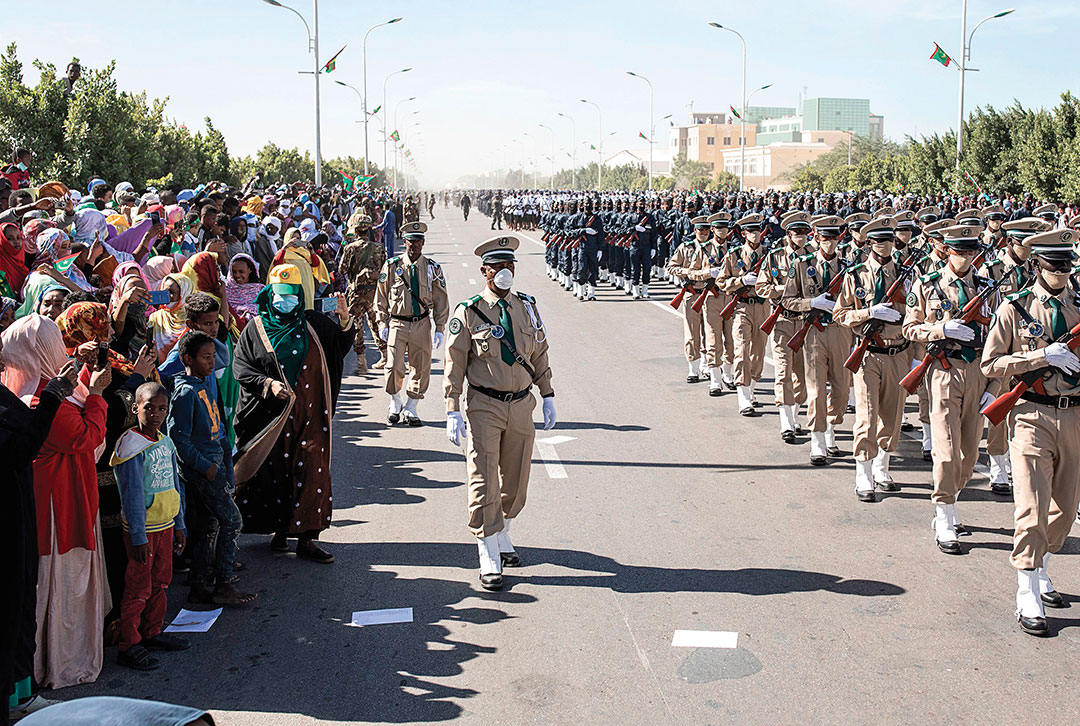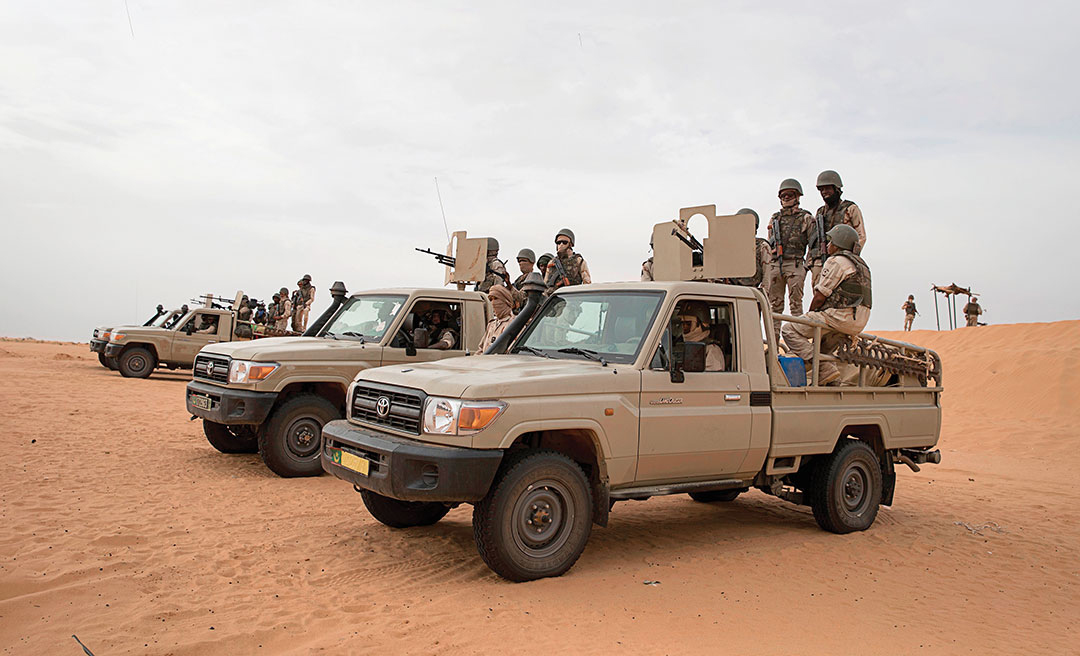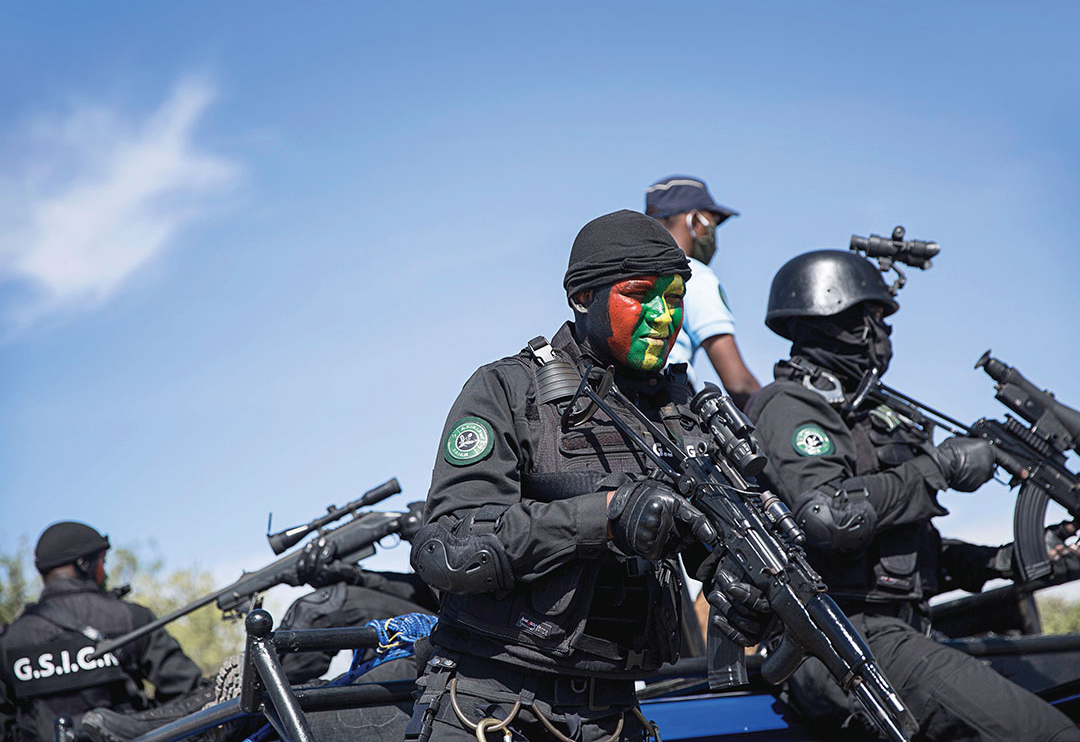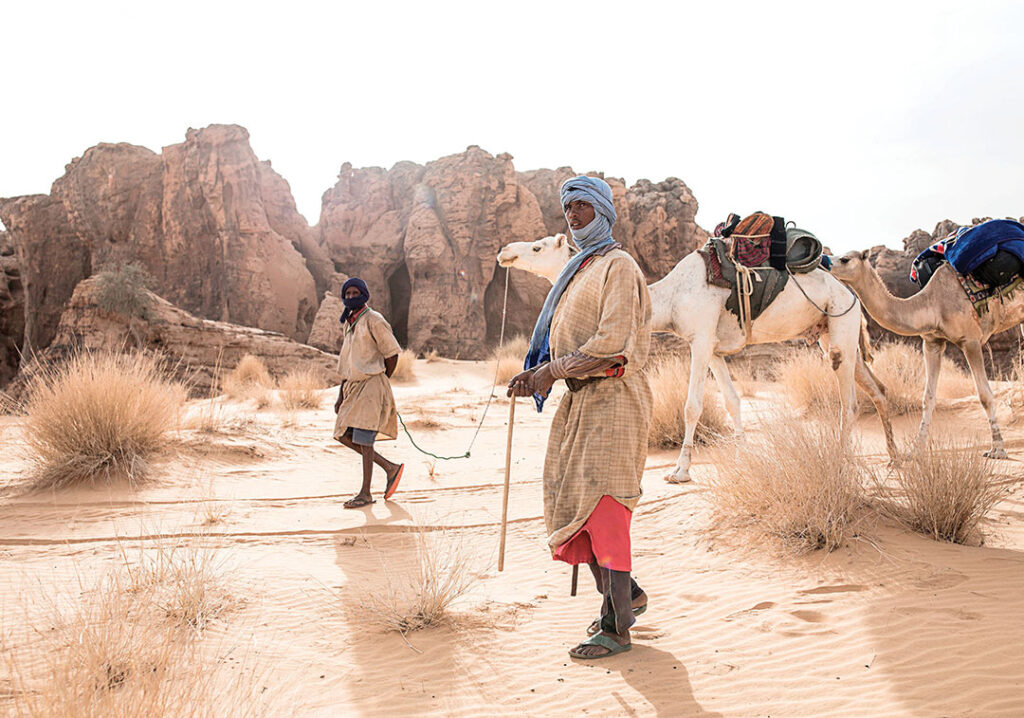ADF STAFF | Photos by AFP/GETTY IMAGES
As dawn gave way to light on June 4, 2005, a few dozen Mauritanian Soldiers began to prepare for their duties in a remote outpost near the Algerian and Malian borders.
The area, known as El Hank, sits in one of the Sahara’s most arid pockets and is known for the comings and goings of bandits and traffickers. It stands as a perfect example of one of Africa’s many ungoverned spaces: far from Mauritania’s capital, Nouakchott, and far from major population centers in neighboring countries.
More than 150 extremists aligned with the Salafist Group for Preaching and Combat swarmed the El Hank outpost, killing at least 15 Soldiers and wounding 17 others before escaping, according to Radio France Internationale. Nine terrorists died in the fighting. The rest stole six all-terrain vehicles and heavy weapons.
The attack, years before the Sahel became synonymous with extremist violence, was among a string of 11 incidents between 2005 and 2011. In the spring of 2005, Mauritanian authorities dismantled an extremist cell. The El Hank attack came a few months later.
There were nine other incidents between 2007 and 2011, the Institute for Security Studies (ISS) reported in December 2019.

So, what changed since 2011? How has Mauritania escaped the fate of so many of its regional neighbors for so long?
First, Mauritania embarked on a campaign to selectively upgrade and provide military hardware, improve infrastructure, and boost training and Soldier pay. Its national military budget quadrupled to $160 million between 2008 and 2018, according to a 2020 Africa Center for Strategic Studies report by Anouar Boukhars, a professor of counterterrorism and countering violent extremism.
Then the government enhanced its engagement in far-flung regions by establishing small communities to concentrate dispersed rural residents. The move created “defensible positions” near the Malian border while improving living conditions and preserving nomadic culture, Boukhars wrote.
Mauritania also chose to open dialogues with extremist elements, a move that it justified as “defensive and necessary.”
“Some observers assert that one of the ingredients to Mauritania’s security successes could be open channels of communication and contact with armed groups and traffickers,” Boukhars wrote. “Others argue that this is shortsighted and undermines regional efforts to tackle transnational violent extremist groups.”
Conditions and context differ when opening dialogues to foster peace. What works in one place, such as Mauritania, might not succeed elsewhere. Potential tradeoffs often must be weighed against the greater good of a nation and its people.

THE POWER OF TALKING
Amid its yearslong period of extremist attacks, Mauritanian authorities decided to address the causes of religious radicalization, according to an April 2022 report for the ISS by senior researcher Hassane Koné and Ornella Moderan, head of the Sahel Programme for the institute’s West Africa office.
The process began with authorities talking to
70 prisoners to learn why they had become radicalized and to transition them back into civilian society. In January 2010, Mauritania commissioned a series of debates by religious dignitaries who helped the participants agree on “the non-violent ideal of jihad.” As a result, two-thirds of the prisoners agreed to renounce extremism and disarm. In exchange, they got pardons or sentence reductions and financial help with reintegration.
The dialogue also sought to stop violent Salafi Islamic ideology from continuing to spread. Mauritania’s approach highlighted Islam’s “tradition of tolerance,” as Koné wrote in a 2019 ISS report.
Some of the Islamic clerics used in the dialogues had been imprisoned themselves, according to a 2019 paper by Frederic Wehrey for the Carnegie Endowment for International Peace. Prisoners were told that they could call for Shariah in Mauritania as long as they did so peacefully and that non-Muslim guests in Mauritania should be considered “protected persons” in accordance with Islamic scriptures.
The government also took a census of madrassas (Quranic schools) so they could be monitored and then recruited hundreds of those students and offered vocational training and work in the public sector to avoid exposing them to extremist propaganda, Koné wrote.
Koné and Moderan are quick to add, however, that Mauritania’s experience will not automatically work for its Sahelian neighbors to the east.
Countries such as Burkina Faso, Mali and, to a lesser extent, Niger are beset by a larger and more diverse array of insurgents and extremists. “For it to work there, dialogue will need to extend to leaders, active fighters and individuals associated with violent extremist groups — both men and women,” Koné and Moderan wrote.
Ideology also is not the only driver of extremist participation.

“Many join to protect themselves, their families or their livelihoods or to retaliate against abuses by the national armed forces,” Koné and Moderan wrote. “These motives often reflect frustrations about social injustice, a lack of opportunities and poor access to basic services such as water, education and health. They are compounded by serious deficits in government security services and justice systems.”
For those reasons, ideology will have to be part of a larger strategy that addresses other drivers of extremism, such as economic, security, social and political reasons, they wrote. Also, rank-and-file fighters might have different reasons for remaining in extremist groups than decision-makers and leaders.
THE DANGERS OF TRADE-OFFS
The idea of talking out differences and negotiating appears positive on its face, but the potential pitfalls are numerous, especially when dealing with violent extremist organizations. Many vital questions arise when considering dialogue. Political scientist Alex Thurston lists several in his August 2022 article for The New Humanitarian, “Peace talks with Sahelian jihadists? It’s worth a shot”:
Can extremists be trusted to engage for reasons other than mere tactical gains?
Would they be willing to renounce ties to global terrorist organizations such as the Islamic State group and al-Qaida?
Would international pressure constrain the potential success of dialogue?
And finally, what do local populations facing imminent danger really want?
The idea is fraught with other problems as well. Governments, nongovernmental organizations and other actors often stress the importance of civilian input in peacebuilding, Thurston wrote. But civilians living in enclaves beset by the constant threat of violence might be willing to agree to conditions unpalatable to national and international actors.
“What if some ‘locals’ are willing to compromise on liberal values, such as secularism, gender equality, or universal access to education, in order to save lives?” Thurston wrote. “Are local voices to be elevated only when they serve liberal peacebuilding goals?”
At times in the past few years, leaders across the Sahel have considered dialogue with extremists. Former prime ministers Christopher Dabiré and Moctar Ouane of Burkina Faso and Mali, respectively, considered it, Koné and Moderan wrote.
In February 2022, Nigerien President Mohamed Bazoum announced that he had released several terrorists in hopes of opening discussions with extremist leaders operating in the Tillabéri region, which borders Benin, Burkina Faso and Mali, according to Jeune Afrique.
Thurston, in an October 2018 report for the Organisation for Economic Co-operation and Development’s West African Papers, warned that striking deals with extremists in one country might risk pushing them into neighboring countries. Such settlements reached in Algeria and Mauritania worsened conditions in Mali, he argued.
State involvement also is crucial, Thurston wrote, because civil society — though important participants in any such effort — will have trouble offering “meaningful concessions or enticements” without government backing.

